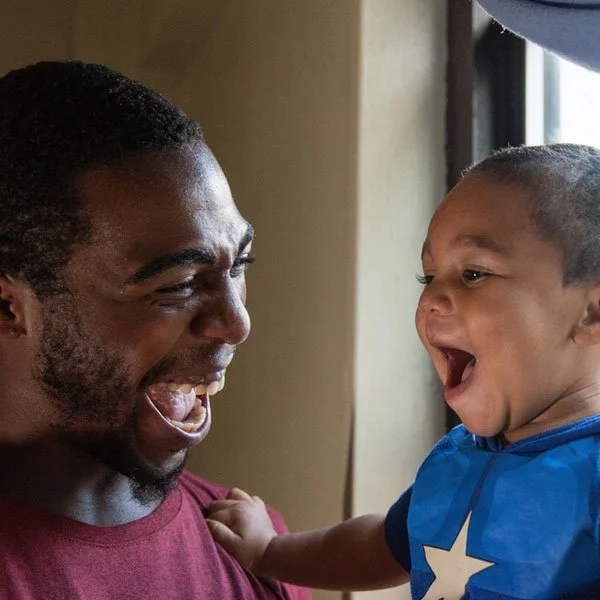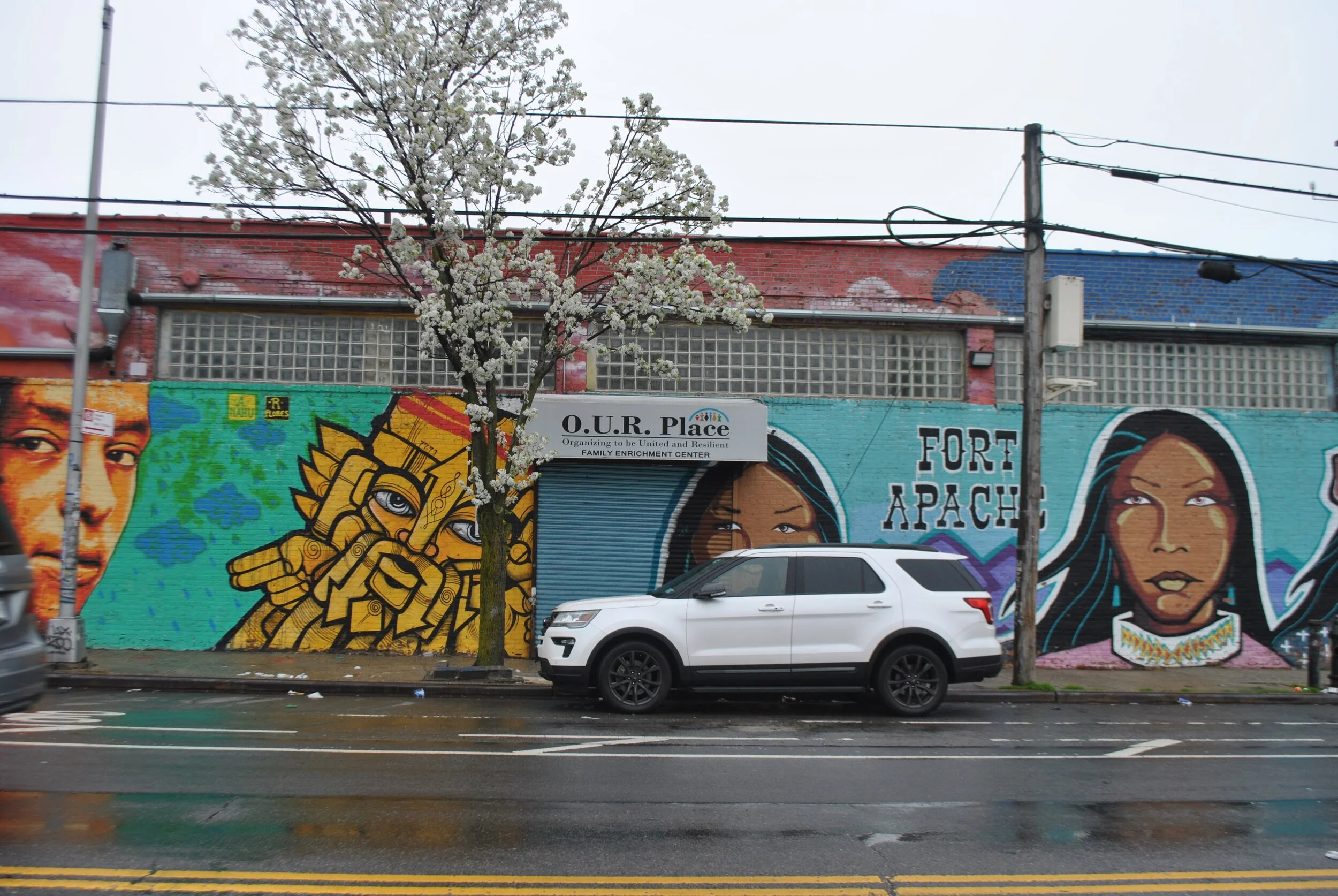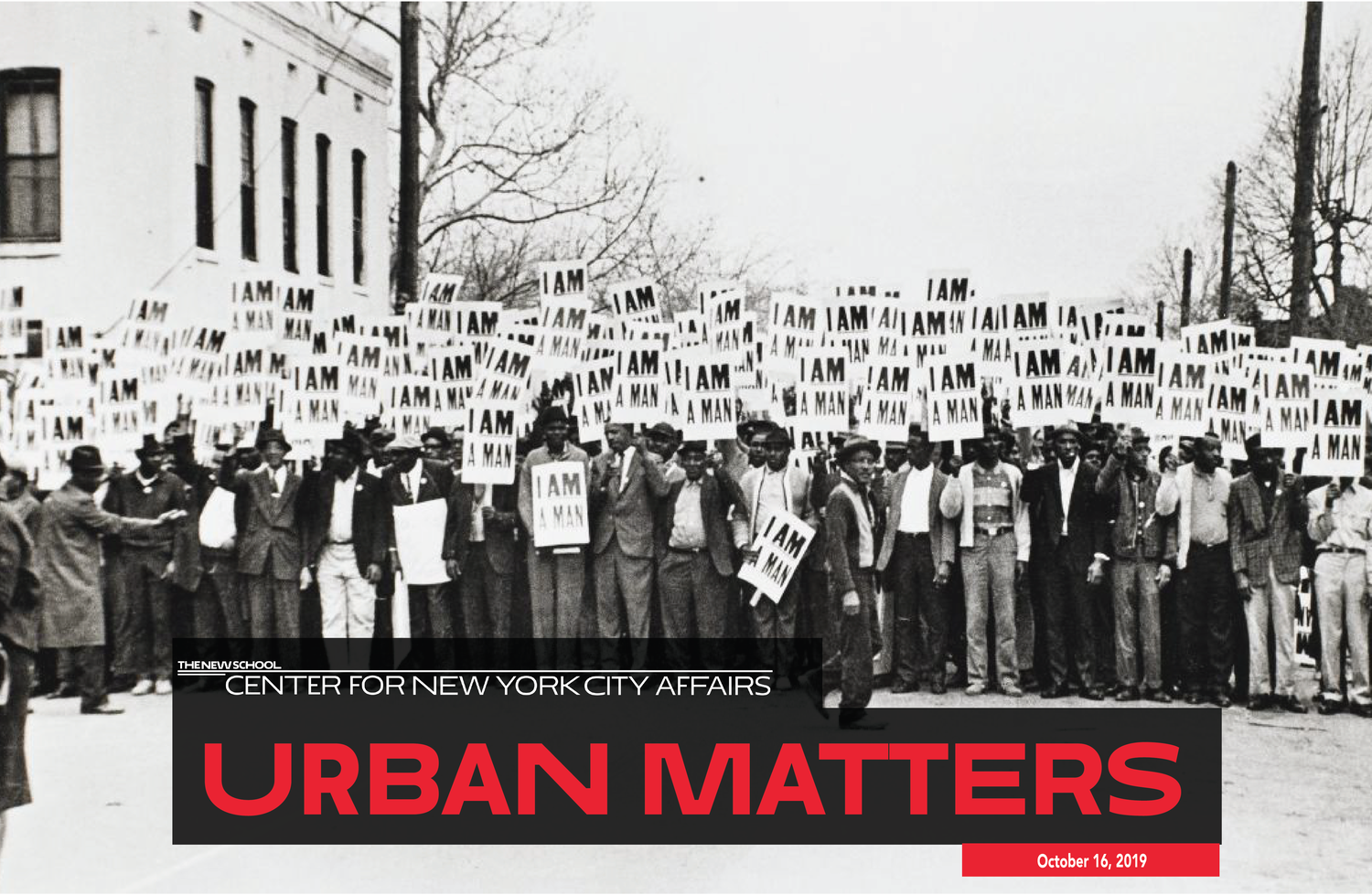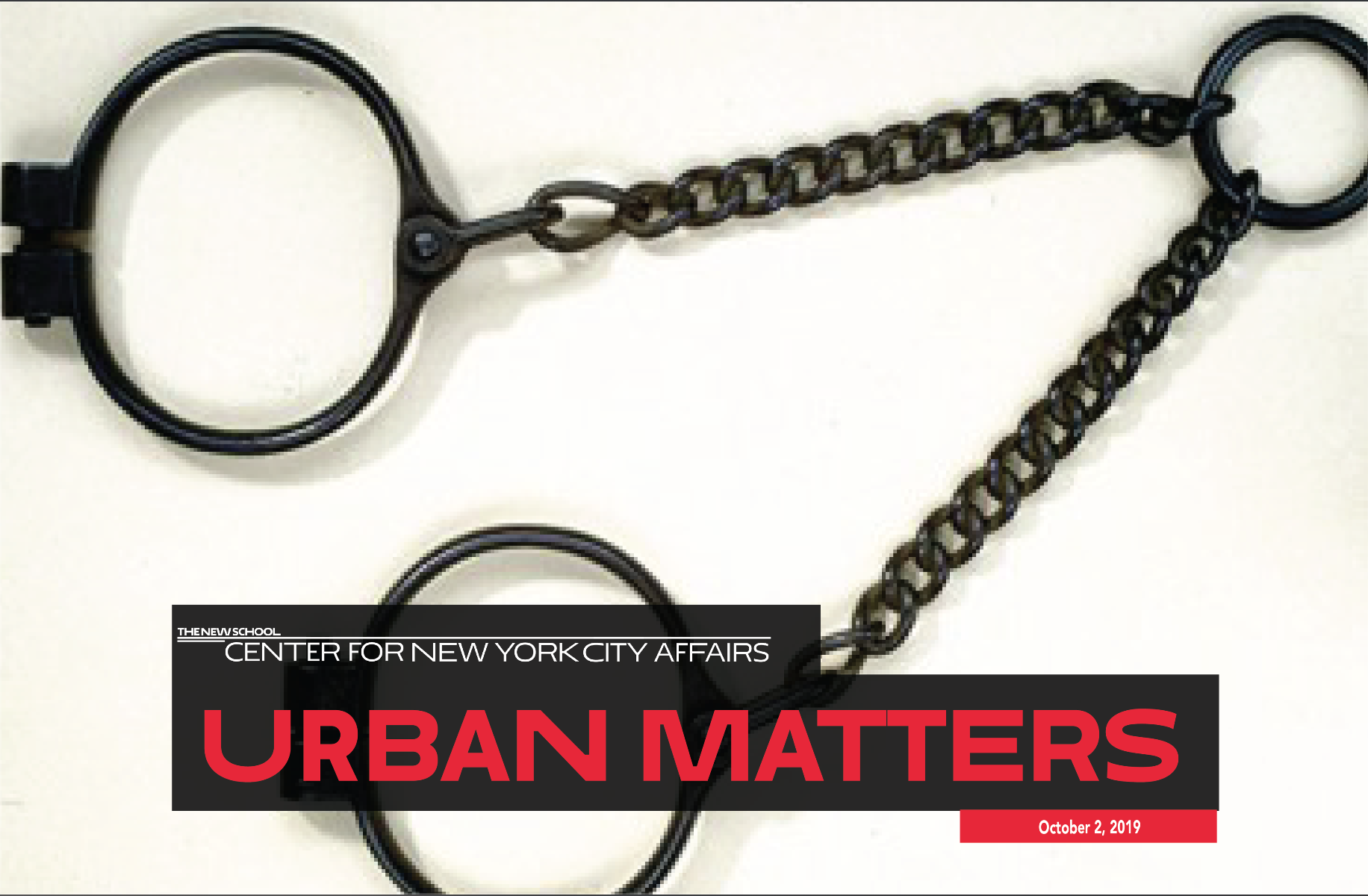When Separate Isn’t Equal: What Accounts for Health Disparities
By Barbara Caress
Sharp differences in Black and White life expectancy, infant mortality, and premature death in New York City are due to racism and its most vicious manifestation, poverty. For just about every leading cause of death in the city, there is a disadvantage by color and by neighborhood -- the consequences of a malignant double whammy of being Black and being poor.
URBAN MATTERS | Racial Equity
Of Poverty, Prison, and the Legacy of Slavery
By Jennifer Jones Austin
On a wall in my office at the Federation of Protestant Welfare Agencies (FPWA) hangs a photograph of protestors marching with placards bearing the now-famous declaration, “I Am a Man.” The iconic image comes from the Memphis sanitation workers’ strike in 1968, where the road to civil rights joined the path to economic equity. It was an intersection that our country had been careening towards for nearly 350 years. In many ways, neither of those destinations – equality or equity – has yet been reached. The harsh effects of the criminal justice system are a major reason why.
URBAN MATTERS | Racial Equity
It’s Personal: Changing How White People Think About Racism
By Marcia Ely
Welcoming audiences to our evening programs is one of my tasks at the Brooklyn Historical Society (BHS). In my words of greeting, I often try to dispel the associations many have of historical societies as dusty places of White perspectives, telling one-sided histories. “Brooklyn Historical Society is not like that,” I say, with urgency. I really want people to get that. I know that distrusting institutions of historical authority is entirely reasonable. Especially in matters of race.
URBAN MATTERS | Racial Equity
Jamestown+ 400 Years: What Stories of Remembrance and Resistance Mean to Us All
By Mindy Thompson Fullilove
This year, 2019, marks the 400th anniversary of the first landing of Africans at colonial Jamestown, to be sold into bondage. Such an historic moment raises challenges of open and honest observance of the full ramifications of that pivotal event – an observance that embraces remembrance and reparation, resistance and reform, contrition and correction.
URBAN MATTERS | Racial Equity
‘There Is No Space for Us’: New York’s Housing Shortage Leaves Hurricane Evacuees in Limbo
By Paula Moura
The terrifying message came via a robo-call on April 20.
“Pack your things. Your stay is not the Federal Emergency Management Agency’s (FEMA’s) responsibility anymore,” Andrea Tejeda, 26, recalls hearing on her cellphone. She was one of a dozen Puerto Rican families dislocated by last September’s devastating Hurricane Maria staying in a hotel on West 38th Street in Manhattan.
URBAN MATTERS | Racial Equity
Chaos or Community: The Tasks that Dr. King Left Us
By Mindy Fullilove, Darrick Hamilton with Chris Famighetti, and Maya Wiley
Fifty years ago today, Dr. Martin Luther King, Jr., was assassinated in Memphis. Just months before his death he authored his final book, Where Do We Go from Here: Chaos or Community? From three different perspectives, three of The New School’s leading scholars tackle that question, and current challenges to creating a more just and humane society.
Urban Matters | Racial Equity
American Heartbreak: Slavery’s Lasting Ecology of Inequality
In 1619, colonists in Jamestown, Virginia bought the first African slaves to be brought to what eventually became the United States. To mark this impending major anniversary of an event lamented by the poet Langston Hughes as “the American Heartbreak,” teachers and students at The New School have launched a project called “400 Years of Inequality.” It’s a university-wide conversation, including a recent week of “curriculum disruptions” in classes ranging from music to mathematics, designed to explore slavery’s enduring impact on American life, history, and the social structure of inequality.
Urban Matters | Racial Equity
Race to Lead: Confronting the Nonprofit Racial Leadership Gap
By Sean Thomas-Breitfeld and Frances Kunreuther
The nonprofit sector is experiencing a racial leadership gap. Studies show the percentage of people of color in the executive director/CEO role has remained under 20% for the last 15 years, even as the country becomes more diverse.
Urban Matters | Racial Equity
℞ for the New York Region: How We Can Create a 'Culture of Health'
By Mandu Sen
When we talk about the wellbeing of a city or region, all too often we use economic data, such as income or employment statistics. Only rarely do we also take stock of our collective health. But there are many appropriate reasons why we ought to.
Urban Matters | Racial Equity | School Integration
Tough Test Ahead: Bringing Racial Diversity To New York’s Specialized High Schools (2016)
By Bruce Cory and Nicole Mader
There’s a longstanding debate about why so few Black and Hispanic students are admitted to New York City’s specialized high schools, including Stuyvesant, Bronx Science, and Brooklyn Tech. They accounted for fewer than 9% of students offered admissions at eight specialized schools for the current school year; that’s down from 9.6% the year before.
Urban Matters | Racial Equity, Inequality & Poverty
The Privilege of Investing in our Kids and the Racial Wealth Gap (2016)
America’s racial disparities in wealth are enormous. The white-to-black disparity in median net worth – the value of what a family owns over and above what it owes is 19 to 1. This vast wealth divide has deep, long-term implications. One consequence is that when black children become adults, they are far less likely than their white counterparts to get financial help from their parents for higher education – a disparity that has financial implications over the course of the adult child’s life and reinforce unequal socio-economic status across generations.
Report | Racial Equity, School Integration
Segregated Schools in Integrated Neighborhoods: The City's Schools Are Even More Divided Than Our Housing (2016)
By Clara Hemphill and Nicole Mader
In multi-ethnic New York City, why are so many elementary schools segregated by race and class? New research demonstrates that school segregation is not always the result of housing patterns.
Events | Racial Equity, Criminal Justice Reform, Education,
The 2015 Henry Cohen Lecture Series
The 2015 Henry Cohen Lecture Series, Public Policy in Action, is devoted to advancing social equity in America. The series examines how public policy serves as a vehicle to advance economic and social inclusion in the context of evolving demographic, economic, and political shifts in America. This series serves as a catalyst for the continuing dialog on the state of social justice in America.
THE NEW CIVIL RIGHTS AGENDA
Ben Jealous, Partner, Kapor Center for Social Impact
Phaedra Ellis-Lamkins, Former CEO, Green for All
Jealous and Ellis-Lamkins speak on The New Civil Rights Agenda. Through this lens questions such as “How do you build an organized movement for racial justice?” and “How can advocates and community activists effectively use public policy as a tool for advancing a new civil rights agenda?” can be explored.
RACIAL DISPARITIES AND THE CRIMINAL JUSTICE SYSTEM
Sam Myers, Jr., Director and Roy Wilkins Professor of Human Relations and Social Justice, Humphrey School of Public Affairs, University of Minnesota.
Monifa Bandele, Senior Campaign Director for MomsRising.org
Myers and Bandele frame their comments around the intersection of incarceration, race, policy, and economic inclusion and exclusion.
RACE, HIGHER EDUCATION & SOCIAL JUSTICE
John Powell, Executive Director of the Haas Institute for a Fair and Inclusive Society, University of California at Berkeley,
Noliwe Rooks, Director of Graduate Studies in Africana Studies, Cornell University.
CHANGING DEMOGRAPHICS AND THE ECONOMIC IMPERATIVE
Manuel Pastor, Director, Program for Environmental and Regional Equity
What are the national demographic shifts and their impact on our country and the economy? What is the “uncommon common ground”? How can policies be used to advance an inclusive agenda that works for all?
REBUILDING THE DREAM:
FRAMING CIVIL RIGHTS FOR THE 21ST CENTURY
Van Jones, President of Dream Corps Unlimited, speaks on “Rebuilding the Dream: Framing Civil Rights for the 21st Century.”
Urban Matters | Racial Equity, Inequality & Poverty
The Stark Black and White of America's Wealth Divide (2015)
By Darrick Hamilton and William Darity, Jr.
Wealth – the value of what you and your family own minus what you owe – matters. A lot. Wealth generates opportunity, fosters well-being, offers children the advantages of debt-free higher education and parent-provided home down-payments, provides capital for business formation and investment, and deflects the slings and arrows of outrageous economic fortune. Wealth is, in short, the paramount indicator of future economic success.























